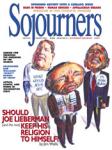In the early 1950s, Memphis record producer Sam Phillips was supposed to have said, "If I can find me a white singer who has the Negro sound and the Negro feel, we'll make a million dollars." He found Elvis.
In 1988, with Jesse Jackson's Rainbow presidential campaign, the moguls of the Democratic Party glimpsed the horrible possibility of a true, multiracial populist uprising against the age of the shrinking wage. It's not hard to imagine them muttering to themselves, "If we can find a 'mainstream' man with that populist feel, we'll get back in the White House."
Bill Clinton, it must be acknowledged, has a little bit of Elvis in him. And it's not just the diet. In his 1992 campaign, Clinton played a "mainstreamed" version of the Rainbow music, and a happy nation danced. But like Elvis, after that first flash of brilliance, he began to disappoint. Elvis left Sam Phillips and went to Hollywood. Clinton stopped listening to his populist musical director, James Carville, and went to Wall Street.
Clinton's new friends told him, "If you try that populist stuff on us, we'll crash the bond market and let you preside over a four-year recession." Soon NAFTA was passed, without the labor provisions candidate Clinton had promised, and those "investments" Labor secretary Robert Reich kept talking about—in worker-training, education, and infrastructure—well, they were put off to an ever-receding tomorrow.
That's the Democrats' dilemma. They climb the charts when they play that fanfare for the common person. But to exercise power (from the top) in this country you've got to harmonize with the global corporations. They have to sound like the party of working families. But they have to do it without challenging the free trade regime that has kept wages down since "Burning Love" was in the Top 10.
So here we go again; at the Democratic convention a flagging Al Gore pulled out a "fight the power" acceptance speech, and he was back in the race within a week. Admittedly, Gore's act owes more to Pat Boone than to Elvis. But it could still work.
The night before Gore's speech, Rage Against the Machine was playing outside the convention hall. It is, of course, the rock band of the millennium, doing what all its ancestors have done before—taking the African-American popular music of the day (blues then, hiphop now) and amping it up into a multiracial cry of revolt. And they show a spirit and savvy that reaches all the way back to blessed Woody Guthrie, the guy who "never saw an outlaw drive a family from its home." Here's singer Zach de la Rocha on the subject of Rage vs. the L.A. police: "We make CDs. We don't beat homeless people, we don't steal or kill people."
They also open the eyes of their young audience to the real world exploitation and suffering that lies behind the pop culture Neverland of Nike and the Gap. This is what the machine fears most: popular culture that tells people NOT to buy things. In L.A., the Democrat's cops pulled the plug on Rage a couple of hours before the legal permit for the protest concert had expired.
Inside the barbed wire, Barbra Streisand was the main attraction for the Democrat's biggest fundraiser. But when Al Gore took his populist minstrel show on that riverboat tour of the heartland, the sound system wasn't crooning "people who need people." It was booming out "Small Town" by John Mellencamp.
Meanwhile, the real John Mellencamp was on a heartland tour of his own. He wasn't working celebrity benefits on Sunset Strip. Mellencamp spent the last days of August wandering around the country with a fiddler and an accordion player, doing free concerts on downtown city streets at lunch hour. He said he wanted to "give something back" to his people. Think about it, Al.
Mellencamp, along with country singer Willie Nelson, is one of the founders and sustainers of Farm Aid, an organization that has done as much for family-based agriculture in America as the entire Democratic Party has since Roosevelt died. And speaking of Willie Nelson, did you know that he's playing campaign fund raisers this year? For Ralph Nader.
DANNY DUNCAN COLLUM, a Sojourners contributing editor, teaches writing at Rust College in Holly Springs, Mississippi.

Got something to say about what you're reading? We value your feedback!